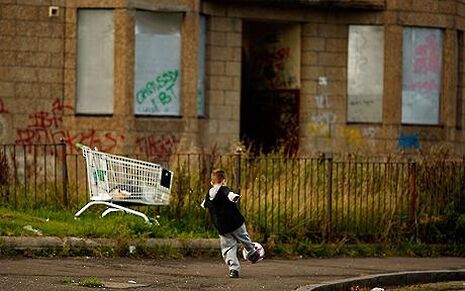How this government is ignoring our children
How the Tories look after the most vulnerable children, and how they look after their own are two separate stories

David Cameron in his 'Nothing Matters More Than Children' opposition speech rightly stated that: “Ending child poverty is central to improving child wellbeing”. He went on to say: "Sometimes a piece of research is published which goes straight to the heart of the national debate – it holds up a mirror to the whole of society and makes us see ourselves as we really are.”
This week the IFS released a report which warned that by the end of David Cameron's parliament there will be 500,000 more children in absolute poverty, raising it to 3million, and, by 2020, 3.3 million young people – almost one in four children – will find themselves in relative child poverty. But what does this actually mean and why is it happening? Why aren't we protecting the most vulnerable, the most promising, our future, our children from “the cuts”?
A child is considered to be in relative poverty if he or she lives in a household whose income is below 60% of the average in that year, and in absolute poverty if he or she lives in a household whose real-terms income is below 60% of the 2010/11 average adjusted for inflation.
In real life terms this means more of our children may be without their winter coats and boots, are more likely to be in abusive home environments, turn to substance misuse or crime and definitely won't have the life expectations or aspirations needed to end the cycle of generational poverty. David Cameron in his 'Nothing Matters More Than Children' speech argued: “A small child doesn’t know there is such a thing as wealth or poverty. But he or she does know that there are such things as love”. A small child does know if it is hungry and cold – what it is to be poor.
David Willets this week blamed the wider economic circumstances. He stated: "you can't ignore the basic rules of economics that when you inherit a situation where an economy has shrunk by 7%, the money isn't there. We're living with the consequences of a serious drop in the economy and that's feeding into living standards across the board."
But the rich aren’t going to suffer in nearly the same way. In fact, things are getting better and better for those who only have to worry about their bins being collected as, at the cost of a mere 250million, they will now be removed weekly and - more good news - our taxes will now also pay for their private schools to become free schools because our government cares so much about them.
There won’t be reforms to capital gains tax, or a tax on properties worth over a couple of million, or a restriction on pension tax breaks for higher earner, or anything done to reduce tax avoidance.
Instead they cut child benefits, Sure Start, the NHS, tax credits, EMA, Connexions, children’s charities, breakfast and after school clubs and the early intervention grant – the things that really helped our most in need. The Universal Tax credit scheme will not work because it can't fight against these cuts or the ludicrous shift to measure tax credit and benefit calculations from the RPI to the lower CPU measure of inflation.
Child poverty fell by nearly a quarter between 1998-2009, as 900,000 children were lifted out of poverty. Now 800,000 are being thrown back in. This isn't just because times are hard. It is because our government is making decisions of what to do with our country's money which are leaving our most vulnerable children, the ones most in need of our support, on the bread line of the Big Society, something which will only end up costing us more - economically and socially - in the long run.
We aren't just missing legally binding targets to reduce child poverty, we are letting a whole generation of potential go to waste – the worst cut to our society of all. We shouldn’t all be in this together. We should be protecting our children.
 Features / Should I stay or should I go? Cambridge students and alumni reflect on how their memories stay with them15 December 2025
Features / Should I stay or should I go? Cambridge students and alumni reflect on how their memories stay with them15 December 2025 News / Cambridge study finds students learn better with notes than AI13 December 2025
News / Cambridge study finds students learn better with notes than AI13 December 2025 Comment / The magic of an eight-week term15 December 2025
Comment / The magic of an eight-week term15 December 2025 News / News In Brief: Michaelmas marriages, monogamous mammals, and messaging manipulation15 December 2025
News / News In Brief: Michaelmas marriages, monogamous mammals, and messaging manipulation15 December 2025 News / Uni Scout and Guide Club affirms trans inclusion 12 December 2025
News / Uni Scout and Guide Club affirms trans inclusion 12 December 2025









